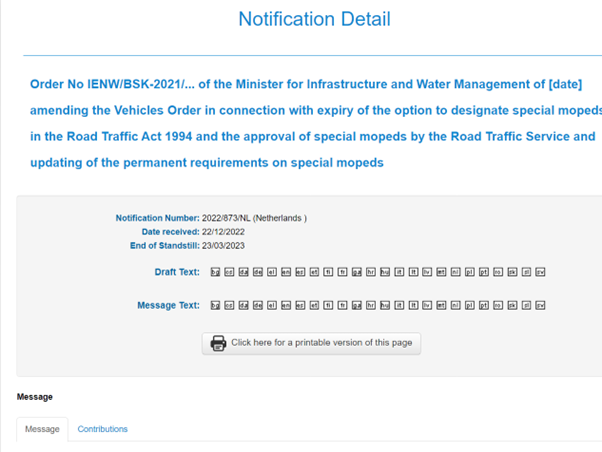
Call for Action: Protest NOW to EU Commission against Dutch LEV- framework
493 days ago
4 minutes
If you have plans to go on the Dutch market with electric cargocycles, electric scooters and/or self-balancing vehicles, then you have every interest in reading this call carefully before Thursday 23 March.
The Netherlands has been preparing some kind of type approval for electric cargocycles, e-scooters and self-balancing vehicles for years. Electric cargocycles up to 25 km/h and 250W are currently allowed on public roads in the Netherlands without such approval. The Dutch government has never reported structural technical problems with these vehicles. E-scooters and self-balancing vehicles are already subject to Dutch approval, although that currently goes against the Netherlands’ own legislation. The approval is anything but a success; there are hardly any approved vehicles on the road.
European Member States cannot just introduce national technical rules. That is regulated by Directive 2015/1535. This law states: “Barriers to trade resulting from technical regulations relating to products may be allowed only where they are necessary in order to meet essential requirements and have an objective in the public interest of which they constitute the main guarantee.“
LEVA-EU has pointed out to the EU Commission that the vehicles concerned are excluded from Regulation 168/2013, following Article 2.2, and are therefore subject to the essential health and safety requirements as required by the Machinery Directive, following Article 1.2(e) 3rd indent, as well as to the EMC and RoHS-Directive. These Directives provide for EU harmonized technical requirements for the vehicles excluded from Regulation 168/2013.
Furthermore, for so-called Personal Light Electric Vehicles (PLEVs), i.e. e-scooters and self-balancing vehicles, there is a European standard, EN 17128. For electric cargocycles, CEN TC333 – WG9 is currently developing European standards, which will be published in the near future. The secretariat of this Working Group is held by the Dutch standardization institute NEN!
As for the grounds for these technical requirements, the Dutch authorities state that the requirements are necessary to ensure road safety. “Setting requirements on the structure of special mopeds for the use phase provides the best and most direct assurance of road safety.” The term special mopeds in this instance refers to electric cargocycles, e-scooters and self-balancing vehicles.
However, the Dutch authorities do not explain which road safety problems these technical requirements are meant to tackle. What’s more, the Netherlands has recently openly stated its support for the new Machinery Regulation as the European legislative technical framework for the vehicles concerned. The Commission had proposed to exclude all road vehicles, not under Regulation 168/2013, from the new Machinery Regulation. Together with the other EU Member States, the Netherlands has gone against this Commission proposal and voted to keep the vehicles in the Machinery Regulation.
The EU technical legislation, i.e. the Machinery -, EMC- and RoHS Directive, is sufficient to ensure the required technical safety level for the vehicles. That is clear from the fact that other Member States, such as France and Belgium, have not introduced additional technical requirements on the vehicles concerned, whilst having allowed them on public roads for several years. This has not resulted in unusually high accident rates that would result from a lack of technical safety in the vehicles.
If the Netherlands were to effectively implement these national technical requirements, this will undoubtedly have a negative impact on the supply of electric cargocycles, self-balancing vehicles and vehicles without a seating position in the Netherlands. Manufacturers will rather choose markets where they can go with European harmonised vehicles. A shrinking supply will in turn jeopardise the sustainability of mobility in the Netherlands with all its negative consequences in terms of emissions, combating climate change, road safety, public health, etc. This would be a particularly bad effect for the Netherlands and its citizens.
For all these reasons, LEVA-EU calls on all Light Electric Vehicle companies with an interest in electric cargocycles, e-scooters and self-balacing vehicles to support LEVA-EU’s request to the Commission and the Member States to reject the Dutch technical regulations. The full text of that request is here: LEVA-EU contribution
You can express your support in a simple way. Go to Notification Number 2022/673/NL. Under the notification itself, there are two buttons: “message” and “contribution”. Click on “contribution” where you can enter the details of your company and state your support for LEVA-EU’s request.
You could for instance state: “Our company fully joins LEVA-EU in this request to reject the Dutch technical regulations. We also join LEVA-EU’s renewed call for a European harmonised legislative framework for light electric vehicles, outside Regulation 168/2013 and outside the Machinery Directive/Regulation.“
Please note that the deadline to contribute is Thursday 23 March, so please do it NOW.
For any further details please contact LEVA-EU Manager, Annick Roetynck: annick@leva-eu.com, tel. +32 475 500 588
Thanks in advance for your support!
Annick Roetynck
Annick is the Manager of LEVA-EU, with decades of experience in two-wheeled and light electric mobility.
Campaign success
Lorem ipsum dolor sit amet, consectetur adipisicing elit, sed do eiusmod tempor incididunt ut labore et dolore magna aliqua.
Member profile
Lorem ipsum dolor sit amet, consectetur adipisicing elit, sed do eiusmod tempor incididunt ut labore et dolore magna aliqua.